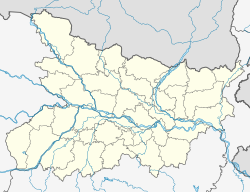Piparpanti Piparpānti | |
|---|---|
Village | |
 Map of Piparpanti (#246824) in Barhara block | |
| Coordinates: 25°39′29″N84°33′02″E / 25.65815°N 84.55064°E [1] | |
| Country | India |
| State | Bihar |
| District | Bhojpur |
| Area | |
• Total | 0.671 km2 (0.259 sq mi) |
| Elevation | 59 m (194 ft) |
| Population (2011) | |
• Total | 3,697 [2] |
| Languages | |
| • Official | Bhojpuri, Hindi |
| Time zone | UTC+5:30 (IST) |
Piparpanti is a village in the western part of Barhara block of Bhojpur district in Bihar, India. As of 2011, its population was 3,697, in 505 households. [2]

